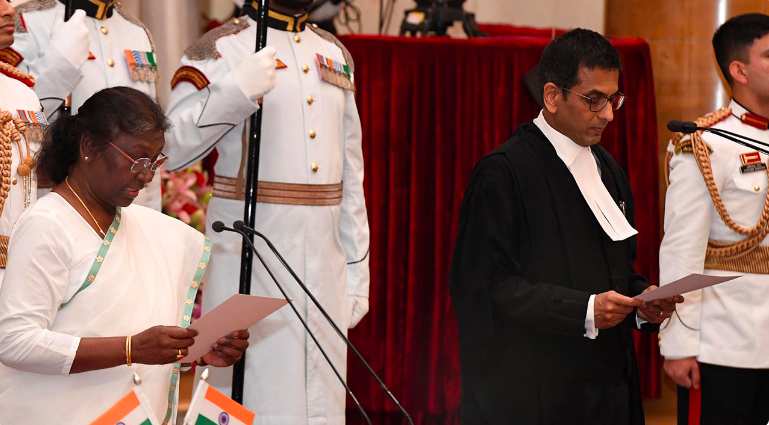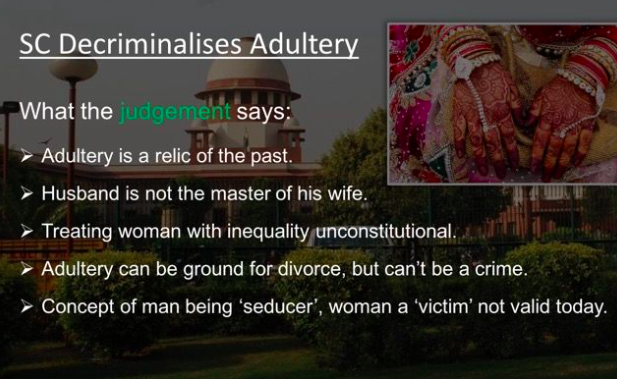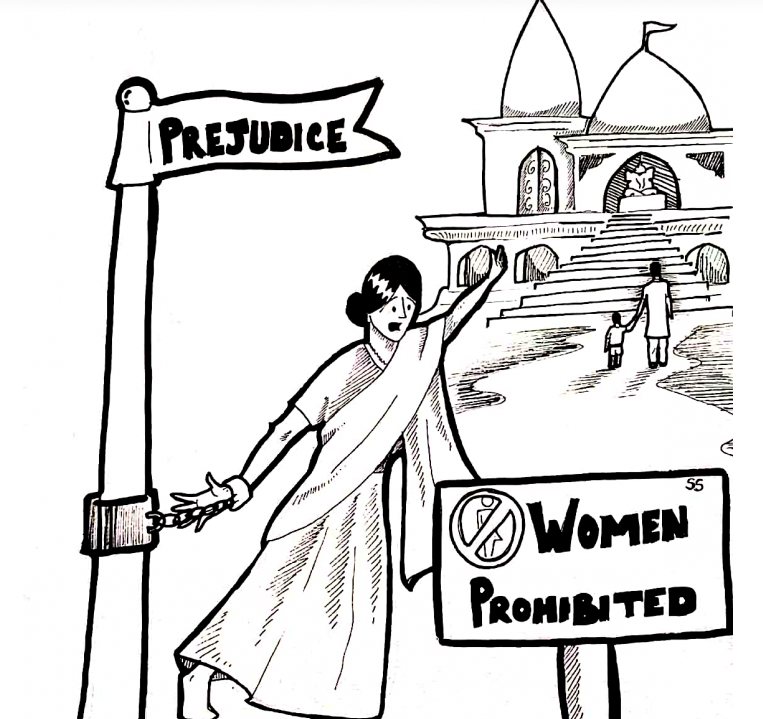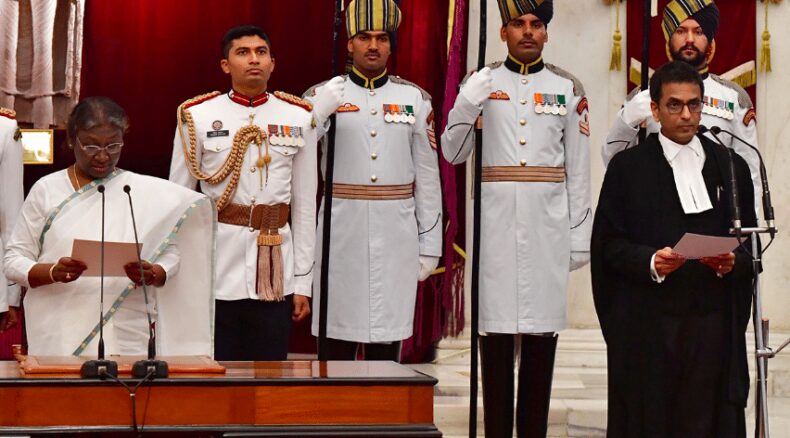India’s 50th Chief Justice, D.Y. Chandrachud, who is well-known for handing down some of the most contentious decisions, was sworn in on November 9, 2022. The CJI’s oath was administered at Rashtrapati Bhawan by President Draupadi Murmu.

Following Justice U.U. Lalit, who served for only 74 days, Justice D.Y. Chandrachud will hold the position for two years, or until November 10, 2022. He is well-known as the son of Y.V. Chandrachud, India’s Chief Justice with the longest tenure, in addition to his affiliation with the landmark rulings.
How is the Chief Justice of India appointed?
The President of India chooses the Chief Justice of India and the other Supreme Court justices in accordance with Clause (2) of Article 124 of the Indian Constitution.
According to the Three Judges Case (1998), the Chief Justice of India will deliver the recommendation to the Government after consulting with a collegium of four of the senior-most Supreme Court judges. The CJI is not permitted to send the suggestion if either of the two judges expresses a contrary opinion. Additionally, the suggestion will not be obligatory on the government if it is sent by the CJI without following the proper protocol.
About Justice D.Y.Chandrachud?
On November 11, 1959, he was born. He graduated with honours from St. Stephen’s College in New Delhi with a BA in Economics. Later, he earned an LLB from Delhi University’s Campus Law Center and a doctorate in judicial services from Harvard Law School in the United States.
He received senior advocate status from the Bombay High Court in June 1998, and the following year, he was appointed additional solicitor general, a position he held till being appointed judge.
He joined the Bombay High Court in 2000 and served there till he was appointed Chief Justice of the Allahabad High Court in October 2013, a position he held for over three years, from October 2013 to May 2016.
Some of his most notable rulings?
Justice D.Y. Chandrachud served on numerous Constitutional Benches and was considered as a legal revolutionary who delivered some significant and forward-thinking rulings.
- RIGHT TO PRIVACY
The ruling concerned the Parliament’s passage of the AADHAAR Act as a money bill. The Supreme Court’s nine-judge panel confirmed the constitutionality of the right to privacy as a fundamental freedom in August 2017. Justice Chandrachud, the lone contrarian in K.S. Puttaswamy v. Union of India, argued that introducing AADHAAR as a money bill was unconstitutional and that the right to privacy and dignity is an integral component of the right to life.

The fact that he rejected his father’s decision in the ADM Jabalpur Case, 1976, in which a five-judge bench ruled that Article 21 is the only source of all rights to life and personal liberty and that when this right is suspended, other rights will also be denied, makes this decision historic. Justice D.Y. Chandrachud described the father’s judgment as flawed.
- DECRIMINALISING SECTION 377 OF THE INDIAN PENAL CODE
The colonial legislation, Section 377 of the Indian Penal Code, declares sexual activity that violates the natural law unlawful and a crime. Justice Chandrachud rejected Section 377 in the Navtej Johar v. Union of India case by claiming that it violated the fundamental rights to equality, expression, privacy, and life. As a first step toward the advancement of the LGBTQ Community and the recognition of their constitutional rights, Justice Chandrachud decriminalised it.

- CASE OF LOVE JIHAD
In Shafin Jahan vs. Ashokan K.M., a girl by the name of Hadiya petitioned the Supreme Court with reference to her marriage to Shafin Jehan, which her family contested on the grounds that their daughter had been brainwashed into agreeing to the union. In this case, Justice Chandrachud affirmed the legality of marriage and declared that every adult has the freedom to choose their marital partner and religion in accordance with their right to privacy and choice.
- SABARIMALA CASE
Justice Chandrachud recognised the rights of women in the Young Lawyers Association v. State of Kerala, where women between the ages of 10 and 50 are prohibited from entering the Sabarimala Temple and claimed that this is a violation of their freedom, liberty, and dignity. And prohibiting the ladies who disobey “Article 17”, which addresses Untouchability and establishes that women are impure during their menstrual cycle.

- DECRIMINALISATION OF ADULTERY
In Joseph Shinde v. Union of India, the Indian Penal Code’s Section 497 was overturned by the bench, which also included Justice Chandrachud. Additionally, Section 198 of the Criminal Procedure Code is deemed unconstitutional since it has long promoted patriarchal ideas and diminished the rights of women. As a result of its violation of the rights to equality, life, and personal liberty, adultery was declared legal.
- THE MTP ACT (MEDICAL TERMINATION OF PREGNANCY)
This was the most recent ruling, issued in September 2022, allowing unmarried women to end their pregnancies between 20 and 24 weeks.
After being appointed Chief Justice of India, Justice Chandrachud made a vow to fill the vacancies as quickly as feasible and to introduce openness and efficiency.













